Late last year the Provincial Court of British Columbia published its 2018/19 Annual Report. Each year the Court shares with the public detailed information about its judges’ demographics, judicial education, caseload statistics and trends, progress in meeting operational standards, governance, budget, and complaints.
To make it easier to digest all this information, our most recent report includes more photographs and a colourful infographic section, “2018/19 at a glance”.
This eNews provides a taste of what you’ll find in the report.
Governance
2018/19 brought the Court a change in leadership. Five weeks into the fiscal year, former Chief Judge Thomas Crabtree was appointed to the Supreme Court of British Columbia. Associate Chief Judge Melissa Gillespie was appointed Acting Chief Judge on May 7, 2018 and Chief Judge on October 18.
At a Welcoming Ceremony on December 14, 2018 speakers lauded Chief Judge Gillespie’s natural ability to lead others; her intelligence, high energy and passion to do justice; her kindness, empathy, and courage. Chief Judge Gillespie’s genuine interest in and respect for people from all walks of life was a recurring theme, as was her ability to listen.
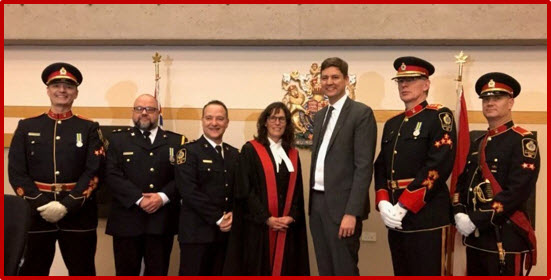
Chief Judge Gillespie spoke of learning from her family the importance of integrity, human connection, and education. She expressed her commitment to work over the next seven years to provide meaningful and accessible justice to all people in British Columbia, and her confidence in the Court’s ability to continue to develop innovative solutions to address the complex access to justice issues facing it today.
Judicial complement and need for more judicial justices
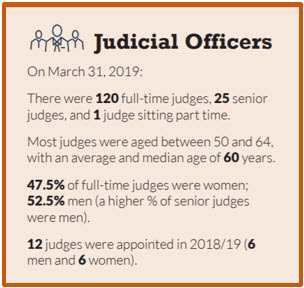
Two part-time judicial justices were appointed in 2018/19, bringing the complement of judicial officers who conduct bail hearings and deal with warrant applications at the Burnaby Justice Centre and preside in court on traffic, bylaw, and ticketable offences to 33 (full- and part-time) as of March 31, 2019.
The report notes that the Court needs to broaden the pool of part-time judicial justices to ensure that adequate judicial resources are available for all shifts at the Justice Centre. BC’s Judicial Council is therefore encouraging anyone interested in part-time adjudication work who has practised as a lawyer in Canada for at least 5 years (or has a range of related experience) to apply.
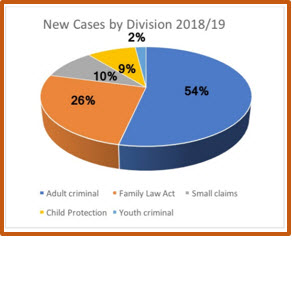
Court's use of business information
The BC Provincial Court makes extensive use of “business information” to measure its performance against the standards it has adopted for case completion and time to trial.
The Court sees reporting its performance in annual and semi-annual reports as an important aspect of its public accountability, and once again provides detailed statistics on caseload, case completion, time to trial and collapse rates.
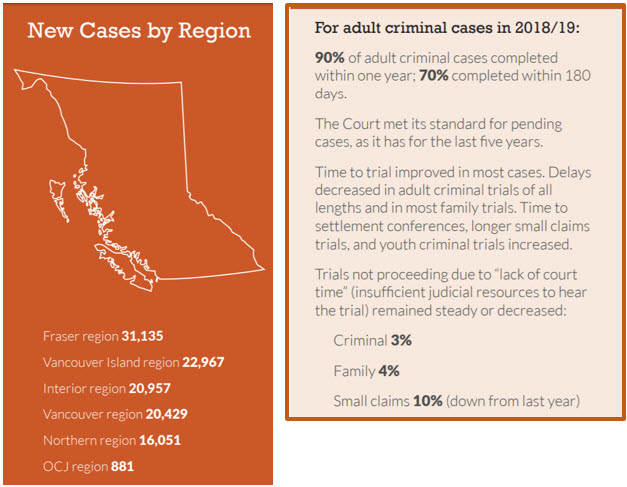
Complaints about judicial officers
As part of the Court’s commitment to transparency, it also publishes summaries of complaints about judicial officers and their outcomes in its annual reports. Although 379 letters of complaint were received, on assessment 370 of them were found not to be complaints within the authority of the Chief Judge. Most amounted to appeals from a judicial decision, and complainants were sent information about appealing. The number of complaints warranting examination in 2018/19 – nine - was the lowest in the last decade.
Court’s use of technology
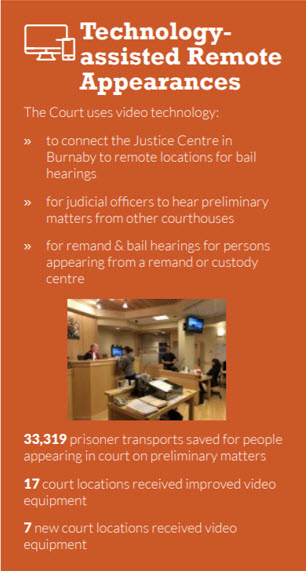
Recognizing the need to improve access to justice in Canada, the Court continues to explore various technological solutions. In 2018/19 the “Have a Judge/Need a Judge” program was added to the Provincial Court Scheduling Project begun in 2013. New software informs judicial case managers around the province in real time when a judge in one courthouse completes their cases and is available by video to hear preliminary matters from another courthouse.
In June 2018, members of the Court’s Criminal Law Committee were part of a team that received a Justice and Public Safety Sector Award for Collaboration for their work creating and implementing lists of standard wording for bail and sentencing orders that are now being used in courthouses around the province to increase accuracy and efficiency.
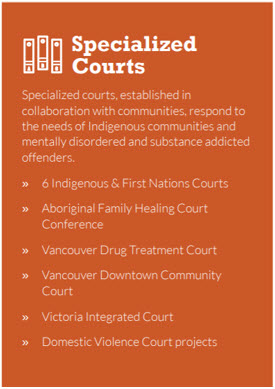
Specialized sentencing courts
The report contains updates on the Court’s specialized sentencing courts, developed in collaboration with communities, service providers, and stakeholders to respond to the needs of Indigenous communities and assist mentally disordered and substance addicted offenders.
The Downtown Community Court in Vancouver, the first such court in Canada, celebrated its 10th anniversary in 2018 and discussions were underway with several other communities about creating innovative ways to meet their unique justice needs, including developing new Indigenous courts.
Communications and international contributions
The Court’s leadership in demystifying the justice system through digital communication and public outreach was recognized when the Court was invited by the Office of the Federal Commissioner of Judicial Affairs to participate in its Support to Judicial Reform in Ukraine project. The Court collaborated with other BC courts in designing and presenting a program for a judicial delegation from Ukraine. The Court also welcomed judges from Guyana as guests at its Criminal Law Boot Camp so they could observe this intense, interactive form of judicial education in action.
Read the report or bookmark it for future reference. You’ll find it at Annual Report 2018/19.

